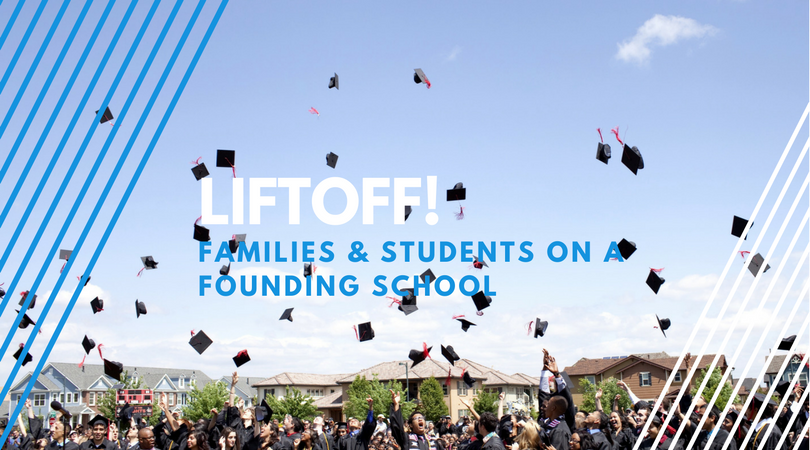Liftoff! Families and Students On Founding Schools
Everything in our world has a starting point. An idea turns into a business, a baby turns into a child, who then becomes an adult; people and things build off that starting point and develop into their fully fledged form. For DSST Public Schools, it’s not different. We build our campuses out not all at once, but by adding a grade each year, starting in 6th grade.
The first class of 6th and 9th graders at any given DSST school have an incredibly unique opportunity: to be a member of a founding class. While it may be a daunting thought, especially for parents, to choose a school with no previous reputation, there are a myriad of benefits to being a part of a founding class.
We talked to a student and her parent who have been part of the founding class of both the middle and high school at DSST: Conservatory Green to find out first-hand exactly why it's great. It’s all about:
Relationships
The small setting of just one class, smaller than even traditionally “small schools”, allows students, faculty, and families to build distinctly strong bonds.
“The best part of being in a founding class - both for middle school and high school - is the level of individualized attention and focus on that class of kids,” says Nicole Hebert, who’s daughter, Olivia is in the DSST: Conservatory Green founding class.
Olivia see’s this personalized attention as a base for incredibly supportive student-teacher relationships, “as the founding class, we build really strong relationships with our teachers. It’s almost like we’re learning as the teachers and the administrators are learning, how to make things so that they’re the best for everyone.”
Each month of the school year brings something new, and as a result an open line of communication, and the shared experience of being a school’s first class, enables a greater trust between students, families, and the school.
Community & Student Voice
Students are the backbone of a school community. When asked what surprised her about her experience in a founding class, Olivia was quick to respond that “the biggest surprise is how much our voice has changed things. When I was in elementary school- the rules were set. And in middle school, we started to have a voice, but it was smaller. But in high school… a lot of changes were made, because we felt like they were needed.”
At the root of change is students working together. “It’s so cool how people come together and work together to make changes in our school, and everyone wants to help each other.” Olivia’s mom has seen this as well, “the kids have an opportunity to shape the community in a really fun way, and Olivia has become more confident through this experience.”
Not only does their community become stronger by students working towards a shared goal, but these changes result in new traditions and opportunities. Students at DSST: Conservatory Green High School held an inaugural Homecoming dance this year, starting a brand new tradition.
Faculty at new schools and campuses even encourage students to identify changes that they want to make at their school, and develop a plan to make them happen. In their Entrepeneurialship class, students at DSST: Conservatory Green High School were pushed in this exact way. “We had to research [the change] and provide reasons why we wanted it changed, and say how it was going to benefit the community”. Ultimately, these efforts were heard and changes were made to the dress code and a wider variety of electives were added to their course options.
There is a large element of trust in a school to execute a fantastic first year, and sometimes families need to help the faculty to “work out some of the kinks, so everything may not be totally seamless”.
Students understand that, but they also see the benefits that come along with the process build out. “The founding class can be difficult sometimes, sometimes they don’t have everything figured out. But i think it’s really cool to be in the founding class, because you’re starting the school and you’re going to set the expectations and what’s going to happen for everyone else. You get to make the school and the community better.”